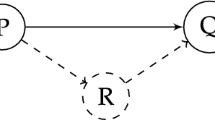Abstract
This paper argues that so-called trumping preemption is in fact overdetermination or early preemption and is thus not a distinctive form of redundant causation. The paper draws a novel lesson from cases thought to be trumping: that the boundary between preemption and overdetermination should be reconsidered.








Similar content being viewed by others
Notes
See Lewis (1973, 1999) and Hall and Paul (2003) for uses of this understanding of completion.
Here, I assume that overdeterminers are, in fact, causes.
Schaffer’s original case, Magic, is odd along two dimensions: first, it uses magical spells, about which it is easy to lack causal intuitions or to consider the classificatory verdict about such processes “spoils to the victor,” in Lewis’ well-known terminology. The idea is that intuitions about the case are too shaky a basis upon which to draw causal conclusions. Second, there are no intermediary events between magical spells and the enchantment, confounding attempts to analyze the structure of causal processes in trumping cases. To get a better grip on what makes trumping distinctive, I introduce a new case before returning to Magic.
Moreover, there might be reason to consider trumping joint causation, in which multiple causes are necessary to bring about an effect in exactly the way it occurs.
For more on physically insensitive effects, see Bernstein, “Overdetermination and Causal Insensitivity” (MS).
Thanks to a referee for this example.
“Overdetermining Causes” (2003).
Let us suppose that the soldiers can recognize and distinguish the respective voices of the higher-ranking officers. Thanks to an anonymous referee for this clarification.
Lewis (2000) picks up on the special features of the case, noting that this might be a case of “cutting” (early) preemption.
References
Bernstein, S. Overdetermination and causal insensitivity (MS).
Funkhouser, E. (2009). Frankfurt cases and overdetermination. Canadian Journal of Philosophy, 39(3), 341–369.
Hall, N., & Paul, L. A. (2003). Causation and preemption. In P. Clark & K. Hawley (Eds.), Philosophy of science today. Oxford: Oxford University Press.
Hall, N., & Paul, L. (2013). Causation: a user’s guide. Oxford: Oxford University Press.
Halpern, J., & Pearl, J. (2005). Causes and explanations: a structural-model approach—part 1: causes. British Journal for the Philosophy of Science, 56, 843–887.
Hitchcock, C. (2011). Trumping and contrastive causation. Synthese, 181, 227–240.
Lewis, D. (1973). Causation. Journal of Philosophy, 70, 556–567.
Lewis, D. (2000). Causation as influence. Journal of Philosophy, 97(4), 182–197.
Menzies, P. (2008). Counterfactual theories of causation. In: Zalta, E. (Ed), The Stanford encyclopedia of philosophy (Summer 2008 edn). http://plato.stanford.edu/archives/sum2008/entries/causation–counterfactual.
Schaffer, J. (2000). Trumping preemption. The Journal of Philosophy, 97(4, Special Issue: Causation), 165–181.
Schaffer, J. (2003). Overdetermining causes. Philosophical Studies, 114, 23–45.
Acknowledgments
Thanks to Christopher Hitchcock, Lewis Powell, Alex Rosenberg, Alex Skiles, Catherine Sutton, and members of the 2013 UMass Mentoring Workshop for valuable feedback on this paper.
Author information
Authors and Affiliations
Corresponding author
Rights and permissions
About this article
Cite this article
Bernstein, S. A Closer Look at Trumping. Acta Anal 30, 41–57 (2015). https://doi.org/10.1007/s12136-014-0231-y
Received:
Accepted:
Published:
Issue Date:
DOI: https://doi.org/10.1007/s12136-014-0231-y



